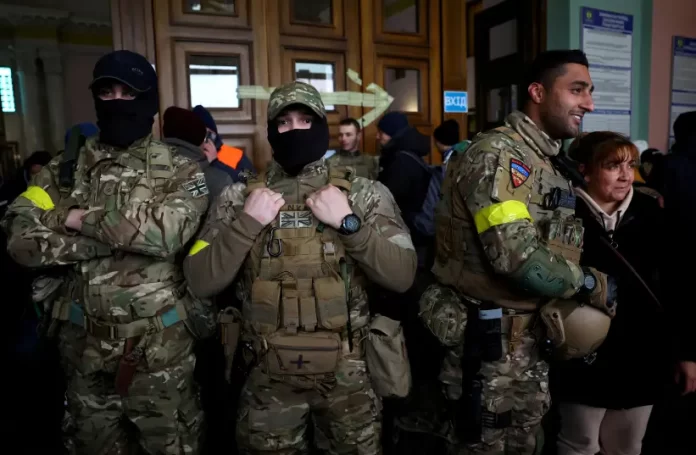
f you’re like me and the IRS burgles a substantial chunk of your annual income, you would hope that money is spent on bettering the country, upgrading our military, helping indigent and displaced veterans, and overhauling the country’s dilapidated infrastructure, as opposed to the federal government using your cash to fund a proxy war benefitting a country known for harboring child sex traffickers. A convergence of evidence, however, clearly illustrates that U.S. tax dollars are clandestinely underwriting an unorthodox definition of foreign aid—funding mercenaries to safeguard child predators and adrenochrome farms in Ukraine.
As reported yesterday, the constitutionalist faction of the U.S. military arrested Office of Budget & Management Director Shalanda Young after obtaining proof she had secretly wired $17bn to the Ukrainian Ministry of Defense on April 2. JAG sources have since told Real Raw News that Young, now at Guantanamo Bay, invoked her 5th Amendment right to remain silent in response to questions about who instructed her to authorize the payout and how Zelenskyy planned to spend the cash. Although she wouldn’t talk and White Hats could only speculate on how Ukraine’s Ministry of Defense would use the cash infusion, sources within Russia’s FSB, or Federal Security Service, have practical knowledge of how Zelenskyy is spending that irrecoverable coinage.
FSB agent Andrei Zakharov told Real Raw News that on April 4 the Ukrainian Ministry of Defense issued an international call to arms, offering mercenaries and soldiers of fortune between $3,000-$10,000/month, based on experience, to swear allegiance to Vladimir Zelenskyy and defend Ukraine from “Russian invaders.”
Zelenskyy must rely on foreign fighters because Russian forces have decimated and demoralized Ukraine’s native military apparatus, Zakharov said.
“The pig Zelenskyy has gotten wealthy from child trafficking and Adrenochrome, but he would not use his wealth to hire a paramilitary. Many Ukrainian oligarchs and government officials are now billionaires thanks to Western-run criminal businesses in Ukraine, but the country is poor. If your criminal government secretly gave him $17bn, that is the money he uses to hire outside help to protect the criminal enterprises,” Zakharov said.
He added that Ukraine’s Ministry of Defense uses an antiquated form of communication—shortwave radio—to reach mercenaries looking for work to remain inconspicuous. It broadcasts encoded messages on Radio Ukraine International, which is heard worldwide through relay stations like WMRI in Miami. The transmissions hold info on how to contact the Ministry of Defense to arrange transportation to Kyiv.
The FSB, Zakharov said, has intercepted and deciphered several such broadcasts.
“Naturally, we watch all transmissions from Ukraine. Our experts found a fundamental message embedded in the radio shows that gives a phone number and an email address to get information on getting to Ukraine and whom to contact when there,” he added.
However, He could not explain how mercenaries know to listen to Radio Ukraine International and decipher the hidden message.
“If we figure that out, I will tell you. Maybe they also use current communication methods like the internet and throw-away phones, but for whatever reason, they are using shortwave too,” Zakharov said.
A day after the first scrambled message hit the airwaves, a caravan of 500 Albanian mercenaries entered Ukraine through Romania, as confirmed by boots-on-the-ground observers and FSB satellite imagery. Since then, a dozen caravans have arrived in Ukraine via Poland, Moldavia, Hungary, and Slovakia, Zakharov said.
“We estimate around 7,000-10,000 men so far,” he explained.
On April 9, Russian intelligence learned that an 800-man-strong column was marching toward Ukraine from the Hungarian city of Nyíregyháza. The FSB had inserted undercover agents into the formation, Zakharov said. After crossing the border, they were met by a Ukrainian official and driven to Kyiv, where, once vetted, they pledged allegiance to Ukraine and were given American weapons and an assignment.
“Our men had forged credentials. They were offered the equivalent of $5,000 United States a month and told that their families would be paid a lump sum of $500,000 for the loss if they died. Some mercenaries got paid more; some got less. Our spies were not asked to go to the front lines,” Zakharov said.
Instead, their orders, signed by General Serhiy Shaptala, instructed them to guard a warehouse near Pisochyn in north-central Ukraine. That building, Zakharov said, held 135 kidnapped children who showed signs of starvation and dehydration. The two Russian agents felt morally compelled to act but faced overwhelming odds—besides them, a dozen genuine mercenaries had also been tasked with guarding the warehouse.
Nonetheless, they turned their weapons on the mercenaries and opened fire, killing seven before falling in battle.
“It is with great sadness they failed. When we learned of the death, we sent Spetznas to destroy the scum and save the children, but when they got there, the warehouse was deserted, and the children were gone,” Zakharov said. “Your country gave Zelenskyy $100bn in arms, and now he has $17bn to hire many men to fight at his bequest. This is tragic.”
In closing, he said Russian President Vladimir Putin would do his best to hunt and kill soldiers of fortune fighting for Zelenskyy.
“No thanks to your criminal government, cleaning Ukraine of pestilence is a very tough job,” he said